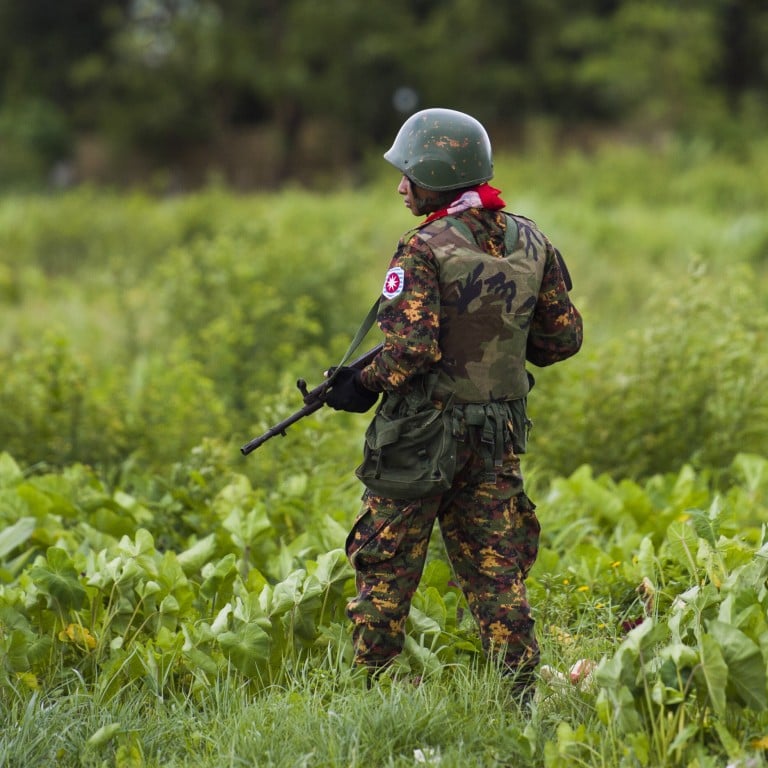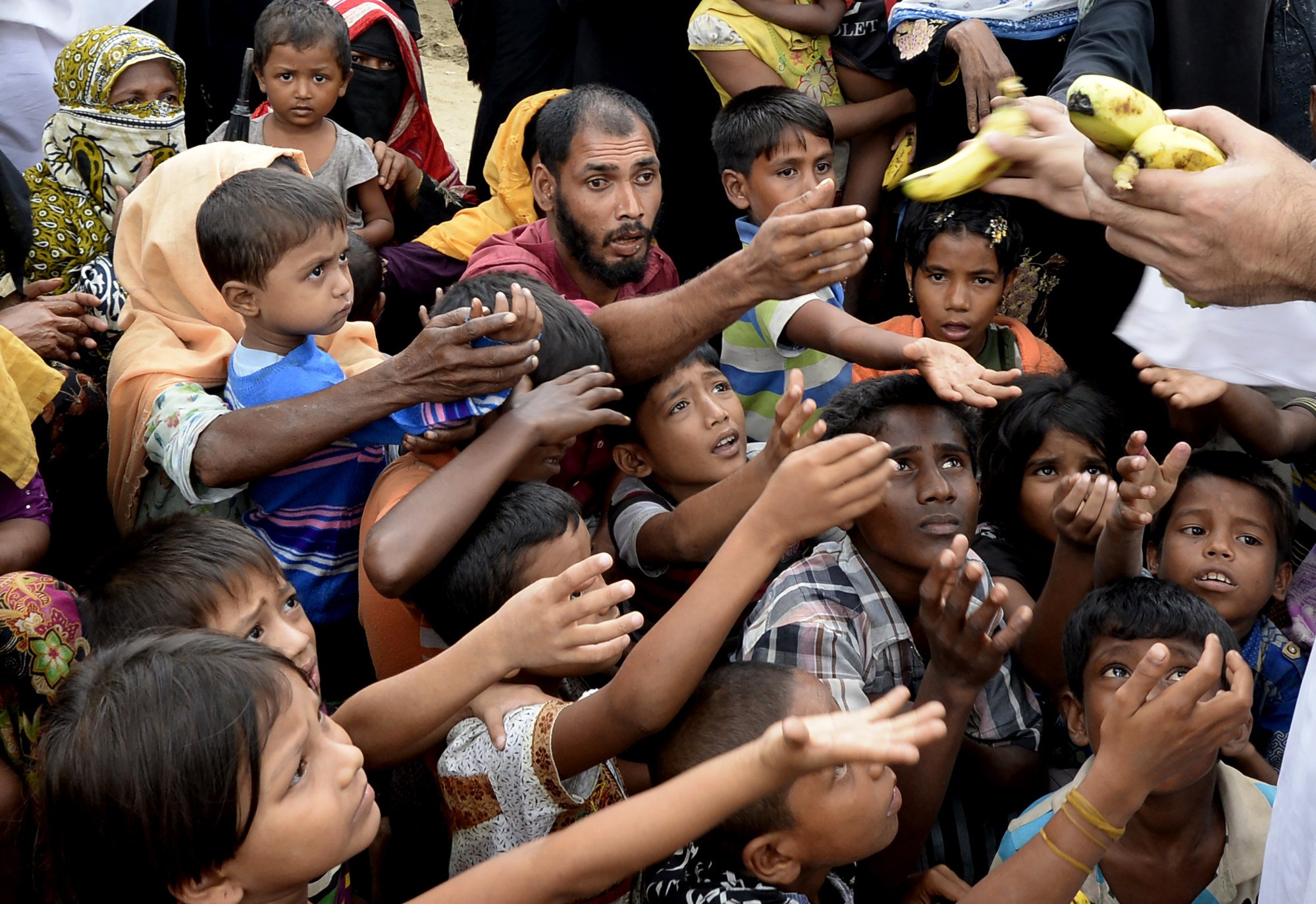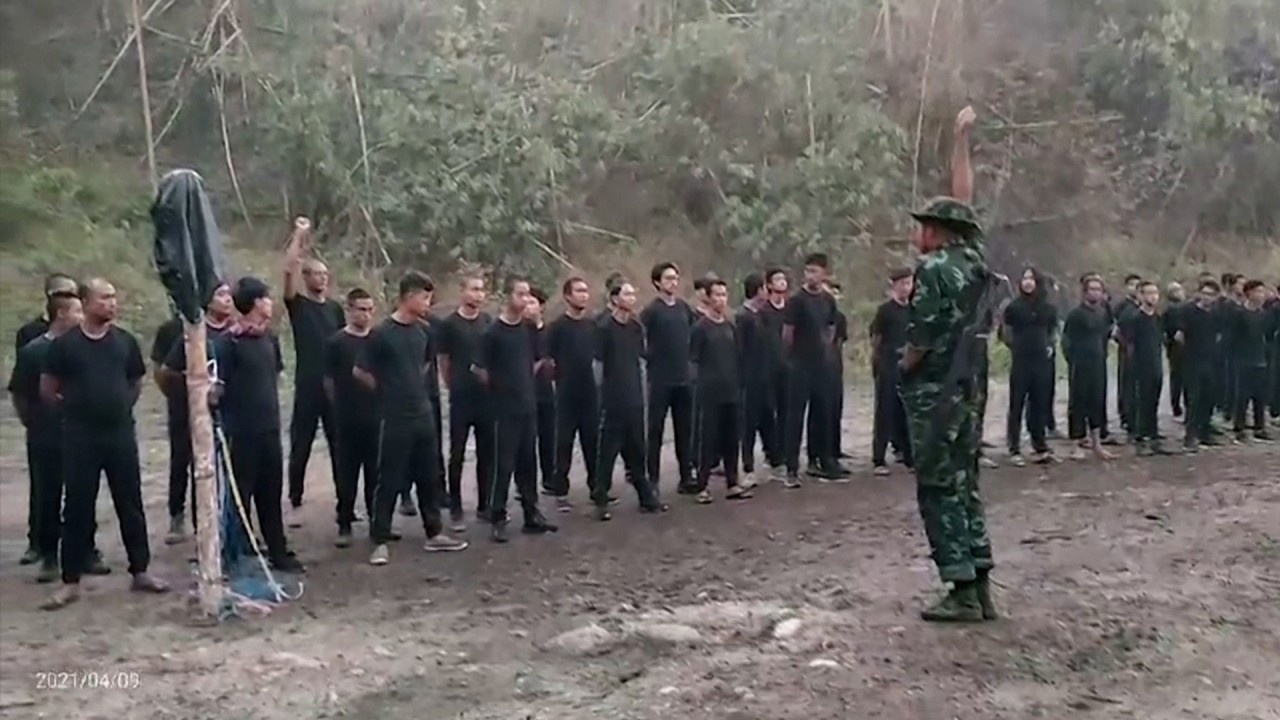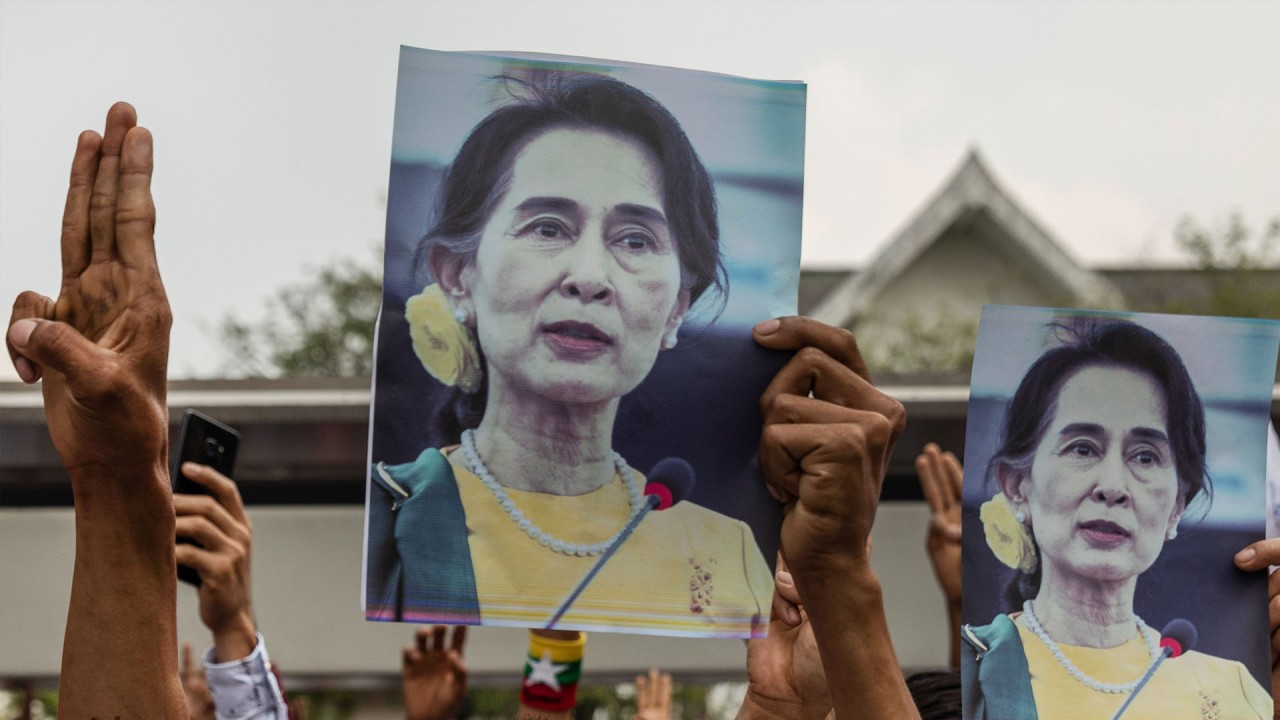
Myanmar’s Arakan rebels cement control over Rakhine state while the junta’s distracted
- A nationwide rebellion against last year’s coup has made space for the Arakan Army and its political wing to entrench de facto control over Rakhine state
- As residents pay the rebel administration taxes and use its courts, the junta says it’s unfazed – but such acts of usurpation would never normally be tolerated
It is a contrast to what’s happening in the country’s northwestern Rakhine state. There, residents like former village administrator Khaing Maung San say they are experiencing a state of relative calm that’s at odds with the mounting violence and economic disruption engulfing the rest of the country.
That state of affairs is a result of a ceasefire dating back to November 2020 – three months before Min Aung Hlaing’s coup – between the Tatmadaw and the Arakan Army, Rakhine’s main rebel group which seeks greater self-autonomy for the state.

With the Tatmadaw preoccupied fighting anti-junta forces across multiple fronts, the Arakan Army’s political wing, the United League of Arakan (ULA), has moved at a lightning pace over the past 12 months to entrench its de facto administrative and judicial control of some 60 per cent of the majority-Buddhist region.
In a rare international media interview this month, Arakan Army leader Major General Twan Mrat Naing said his 30,000-odd force had their “daggers drawn” amid an “uncertain” ceasefire with the junta.
“It’s uncertain how long the ceasefire will last, but we wish to have a meaningful ceasefire for mutual benefit and interests,” Twan Mrat Naing told Asia Times.
The Arakan Army major general, who at 43 is among the youngest rebel commanders in the country, said the group had established their “own administration with judicial, taxation, public security branches and other governmental institutions” – infuriating the junta.
He had decided to take up arms, he said, because of a personal conviction that “our sovereignty and a rightful political status for Arakan” must be reclaimed and restored.
Administrative rebellion
Residents of Rakhine told This Week in Asia they were not only paying taxes to the rebel force, but turning to the ULA’s courts and municipal authorities to adjudicate disputes, while the Arakan national anthem was being sung in schools and at public events instead of the Myanmar one.
A schoolteacher said the red-and-white Arakan flag flew at her school, which is ostensibly under junta administration.
‘The emperor has no clothes’: Myanmar’s junta still fighting for legitimacy
In normal times, the ULA’s seemingly outright usurpation of executive power would have not been tolerated by Naypyidaw, but right now junta chief Min Aung Hlaing is distracted by the national rebellion – and the likes of Khaing Maung San say they hope it stays that way.
“All residents from our township go to the ULA’s local offices now to make both criminal and civil complaints, and also regularly pay taxes,” Khaing Maung San said in an interview.
The 35-year-old was among dozens of village administrators who resigned in March 2019 – before the coup – when the military staged a crackdown on village-level officials who purportedly had ties with the Arakan Army.
A dramatic about-turn has taken place in the years since, with the Arakan Army not only agreeing to a ceasefire with the Tatmadaw following years of fierce fighting, but also being removed from military authorities’ “terrorism” list in the aftermath of the February 1 coup.
Khaing Thuka, an Arakan Army spokesperson, said a “majority” of people from Rakhine’s townships – including the Muslim community – were utilising the ULA’s courts.
Myanmar military’s massacres mount as activists call for arms embargo
Part of the public enthusiasm for the ULA and the Arakan Army has to do with the state’s complex recent political history.
“Since the country gained independence in 1948, the Arakan people have been fighting for self-determination through both violence and non-violence – but they didn’t get anything like what they have at present,” said the analyst, who asked for his name to be withheld for security reasons. “This is the reason they are participating in and supporting the current political movement.”
Under Suu Kyi’s de facto rule of the country from 2016 until last year’s coup, the Arakan Army’s armed insurgency – which began following its 2009 founding – intensified amid a stepped up offensive by the Tatmadaw. The fighting led to the displacement of more than 230,000 civilians and the deaths or serious maiming of at least 1,000 people.
In 2017’s now infamous military crackdown on the Rohingya, which led to the outbreak of a pogrom involving 700,000 people, some members of the region’s majority Buddhist community were also affected.
Ill feelings towards the NLD were further exacerbated after the NLD government cancelled voting in Rakhine for about 1.2 million residents, or about 73 per cent of the state’s voters in the November 2020 polls. The NLD administration said the decision was motivated by security concerns amid the insurgency.
In the vote, the NLD won just eight out of 35 seats in the state legislature. The Arakan National Party – which backs self-determination for the region – won 22.
Thor Zurn Twan, an external relations and diplomatic affairs officer with the Arakan Students’ Union, said residents from his native Ramree township had indicated they were more satisfied with the ULA’s control of judicial and administrative processes compared to the past.
“Naturally, the people didn’t believe in successive Burmese governments’ judicial processes and the courts’ decisions, but they had to [use those courts] because they had no choice,” Thor Zurn Twan said, adding that in the past there had been “a lot of corruption”.

Muslim matters
Observers have identified the Arakan Army’s policies towards the state’s Muslims as a key determiner of its staying power in Rakhine.
The group has previously referred to the Rohingya as “Bengali Muslims” – a term used by the NLD and Tatmadaw in a pejorative manner to suggest the community’s roots were in neighbouring Bangladesh and not Rakhine.
In the Asia Times interview, Twan Mrat Naing said his group recognised the “human rights and citizenship” of all residents of Rakhine, but cautioned that “a massive repatriation of refugees in the current situation could unleash a new wave of unrest”.
He also underscored the Arakan Army’s long-held view that most of the state’s residents did not support use of the term “Rohingya”.
“They find it offensive as they feel that it deprives them of their history. They are the original inhabitants of the land,” he said.
Tortured, executed, shot: a junta’s way of death in post-coup Myanmar
On the ground, Muslims say there are signs that things may be changing for the better.
A village administrator from the Muslim community in Buthidaung township said the Arakan Army had shown itself more capable of dealing with day-to-day issues compared to past administrations.
“We have been working [with the Arakan Army] judiciary and administration [since] before the coup … and prefer to engage with them when we face problems,” he said.
The Arakan Army chief is the first leader in recent decades … to have the courage to do what is morally right
Aung Kyaw Moe, a Rohingya activist who currently serves as an adviser to the anti-junta shadow administration, the National Unity Government, said Twan Mrat Naing’s recent remarks on recognition of the Rohingya’s rights were to be welcomed.
“It is a great positive step. The Arakan Army chief is the first leader in recent decades of Rakhine politics to have the courage to do what is morally right,” he said.
While the long-term goal, as the rebel group’s spokesman Khaing Thuka put it, was to “wrestle back lost sovereignty” by all means necessary, he said the more immediate concern was insulating the state from violence and ensuring residents’ livelihoods were not hindered.
Myanmar army’s landmines at oil, gas pipelines near China ‘likely to backfire’
With the Arakan Army in control of roughly 60 per cent of Rakhine, a large number of the state’s residents are still forced to deal with the Tatmadaw on a daily basis.
Aung Kyaw Moe said oppression of the Rohingya was continuing, while all residents have been subjected to increased movement restrictions in the post-coup era.
“If they do not have this assistance, the situation could be devastating,” he said.
Why India’s worried about China and Myanmar as conflict flares up in the northeast
The Tatmadaw, at least in public, portrays itself as unfazed by the Arakan’s Army strengthening clout.
“We have seen many instigations by our enemies to try to get the Arakan Army to become involved in fighting,” junta spokesman Zaw Min Tun was quoted as saying by Radio Free Asia last week.
“This has created various misunderstandings between the military and the Arakan Army at the ground level. I would like to say that we have a strong relationship at both the top and bottom levels.”
The Sittwe-based analyst suggested the chances of fighting resuming in the state was less likely given the Tatmadaw’s preoccupation with the insurgency elsewhere.
“The military is facing offensive attacks from People’s Defence Forces in central Burma, and ethnic armed groups in Kachin, Kayah, Karen and other parts of Myanmar,” he said. “So, the military will not enter into battle in Arakan.”







